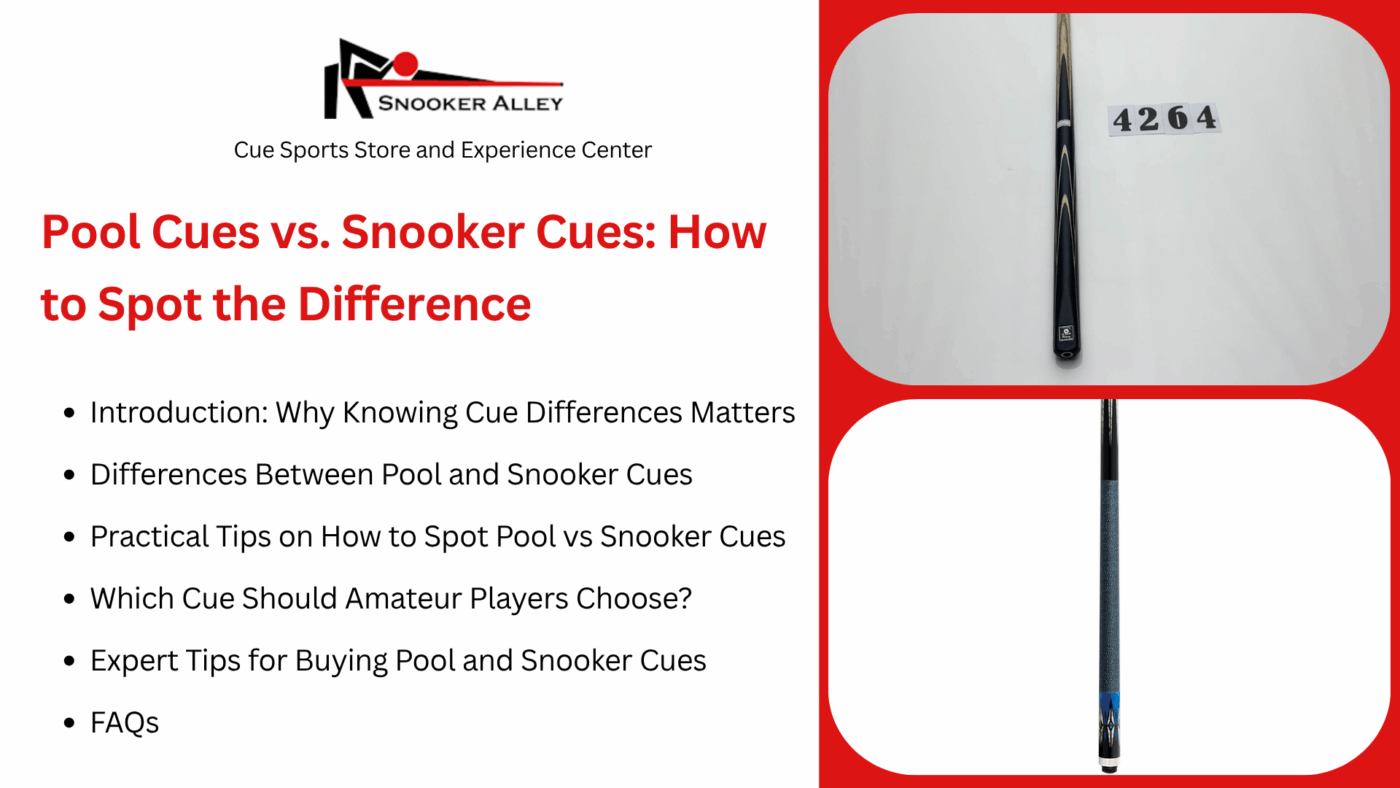Team Snookeralley
Pool Cues vs. Snooker Cues – How to Spot the Difference (Detailed Guide for Amateur Players)
Pool Cues vs. Snooker Cues
If you’re an amateur cue sports player looking to improve your game or preparing to buy your first cue, understanding the subtle but important distinctions between pool cues and snooker cues is essential.
This detailed guide breaks down every key difference, highlights why the right cue matters, and helps you confidently buy pool cues or buy snooker cues tailored perfectly to your playing style.
Introduction: Why Knowing Cue Differences Matters
Choosing between a pool cue and a snooker cue goes beyond just picking a stick—it influences your control, precision, and overall performance on the table. Both cues share similarity, but they are designed to meet the specific needs of their respective games.
This article is crafted for amateur cue sports players to help them understand and spot the differences, so you can select the best cue to elevate your game.

Differences Between Pool and Snooker Cues
1. Cue Length and Weight – Designed for the Game
- Pool cues generally measure 58 inches in length and come in the weight range of 18 to 21 ounces. The extra length and weight help accommodate the power and spin needed to maneuver the larger, heavier pool balls.
- On the other hand, snooker cues are typically a bit shorter, around 57 inches, and lighter, weighing approximately 16 to 18 ounces. The lighter weight suits the delicate and precise shots common in snooker, where finesse outweighs brute strength.
2. Tip Size – The Most Noticeable Difference
The tip size is one of the easiest ways to spot the difference between snooker and pool cues:
- Pool cues have larger tips, usually between 12.5mm and 13mm in diameter, to manage the bigger pool balls and to apply powerful spin.
- Snooker cues’ tips are significantly smaller, falling in the 9mm to 10.5mm range, aligning with the smaller cue balls and requiring neater cue ball control.
If you pick up a cue with a tip size under 11mm, it’s likely a snooker cue.
3. Shaft and Taper – Impacting Feel and Control
- The shaft taper on pool cues is more aggressive, tapering sharply to support heavy breaks and strong cue ball control.
- In contrast, snooker cues have a gentler taper, promoting a smoother stroke ideal for precision shots typical in their game.
This difference strongly affects how the cue feels during play and impacts the feedback you get through the cue.
4. Wood and Construction Materials
- Pool cues frequently utilize North American maple, prized for its hardness and smooth finish, sometimes reinforced with fiberglass for durability.
- Conversely, snooker cues are often made from ash wood, notable for its straight, visible grain and superior feedback, facilitating delicate shots.
Examining grain structure visually can often hint whether you’re handling a pool or snooker cue.
5. Ferrule Differences
- The ferrule length on pool cues is generally longer, enhancing durability especially during powerful shots.
- Snooker cues exhibit a shorter ferrule, which contributes to a better feel for soft, precise contacts with the ball.
Practical Tips on How to Spot Pool vs Snooker Cues
Knowing what to look for when inspecting a cue can save you time and help avoid costly mistakes:
- Weight check: Pool cues feel heavier in hand compared to the lighter snooker cues.
- Tip diameter: Measure or estimate if the tip is smaller than 11mm, it’s for snooker.
- Visual wood grain: Ash’s pronounced grain indicates a snooker cue; smoother finishes usually mean maple pool cues.
- Shaft taper: Feel the transition along the shaft to notice a gradual taper with snooker cues versus a quicker one for pool cues.
- Playability test: If possible, test the cue for control in a game setting — snooker cues allow for finesse, while pool cues handle power shots better.
Which Cue Should Amateur Players Choose?
Matching Your Cue to Your Game
Understanding which cue to buy depends on your preferred cue sport, skill level, and personal feel:
| Player Profile | Recommended Cue Type | Reason |
|---|---|---|
| Beginner in Snooker | Lighter snooker cue with 9-10.5mm tip | Enables better accuracy for delicate shots |
| Beginner in Pool | Heavier pool cue, 12.5–13mm tip | Assists control over heavier balls and power shots |
| Dual-Game Players | Ideally, own separate cues or hybrid models | Each cue type is optimized for distinct gameplay demands |
| Casual Players Deciding to Buy | Focus on game you most frequently play | Ensures better performance and enjoyment |
Can You Use a Snooker Cue to Play Pool? Or Vice Versa?
Technically you can use the wrong cue type, but the differences in size, weight, and tip size will result in compromised play. Using a pool cue for snooker might reduce the precision you need, while a snooker cue used for pool might not offer the power for specific shots.
Expert Tips for Buying Pool and Snooker Cues
- Try before you buy: Visit showrooms to hold and feel both types of cues.
- Consider brands with a strong reputation: Brands like Peradon and Phoenix offer high-quality cues specifically tailored for both snooker and pool.
- Ask about accessories: Proper cases, cue chalk, and maintenance kits prolong cue lifespan.
- Evaluate your budget: Beginner-friendly cues exist alongside premium tournament-grade models.
- Get expert advice: Consult with professionals or retailers who can guide you based on your style.
Buy Smart, Play Better: Spot the difference between pool cues vs snooker cues
Knowing how to visually and physically spot the difference between pool vs snooker cues allows amateur players to make choices that enhance their enjoyment and performance. Whether you want to buy pool cues or buy snooker cues, always check key aspects like tip size, cue weight, shaft taper, and materials to select the perfect match.
Ready to take the next step? Visit specialty retailers or an experience showroom for hands-on advice and try out cues before your purchase. The right cue builds not just confidence but transforms the way you play.
Leverage your new knowledge to find the perfect cue today and start playing your best game!
Trusted Recommendation: Buy Your Cue from Snooker Alley
If you’re ready to buy a pool cue or buy a snooker cue, look no further than Snooker Alley – India’s leading manufacturer and retailer of professional-grade cue sports equipment.
Why Snooker Alley?
✅ Established Expertise: Since 2002, Snooker Alley has been serving India’s cue sports community with champion-quality tables, cues, and accessories—trusted by professionals and coaches across the nation.
✅ Exclusive Showroom in Bangalore: Experience India’s first and only exclusive cue sports experience center, where you can test different cues in a real playing environment before you buy.
✅ Top Brands & Premium Selection:
- Snooker Cues: Includes renowned English brands like Peradon, Phoenix, and premium ash cues made for precision.
- Pool Cues: Choose from world-class hardwood cues ideal for Indian and American pool.
- Full range includes hybrid cues, break cues, cue cases, chalks, and maintenance kits.
✅ Cue Matching Advice: Not sure what to choose? Snooker Alley’s experts—many of them former state players—offer personalized advice to ensure you pick the right cue based on your height, strength, hand size, and playing style.
🎱 Visit Snooker Alley in Bangalore or shop online to explore authentic snooker and pool cues designed for both performance and durability.
🔗 Browse Now: https://snookeralley.com
📍 Location: 18/3, Andree Road, Shantinagar, Bangalore – India’s premier destination for cue sports enthusiasts.
FAQs about Pool Cues vs. Snooker Cues
Pool cues are heavier, longer, and have larger tips made often of maple, while snooker cues are lighter, shorter, with smaller tips and usually crafted from ash.
Very important. Tip size directly affects cue ball control and spin, matching the ball size differences in pool and snooker.
While possible, you’ll struggle with power shots and control. Using a sport-specific cue guarantees better results.
Yes, snooker cues weigh about 16-18 ounces; pool cues typically weigh 18-21 ounces.
For beginners, it’s best to buy the cue dedicated to the game you play most to build proper technique.

